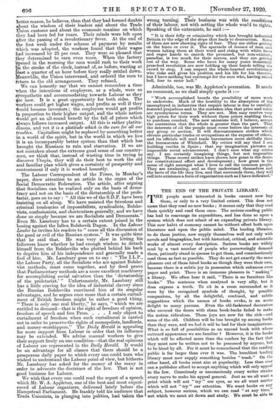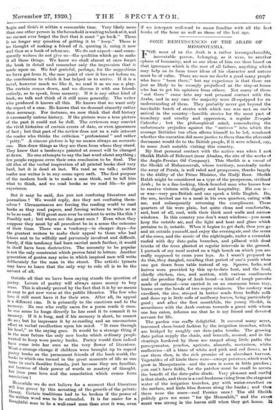THE END OF '111E PRIVATE LIBRARY.
MHE people most interested in books cannot now buy • them, or only to a very limited extent. This does not mean that they read no new books ; it means only that they read them quickly and read them once. The serious-reading public has had to rearrange its expenditure, and has done -so upon a system which does not- admit of an expanding private library. This new habit of economy cannot be without effect both upon literature and upon the public mind. The lending libraries, to do them justice, now supply themselves well not only with novels and biographies, but with historical, critical, and scientific works of almost every description. Serious books are widely read by a vast number of people who perseveringly demand them, patiently stand in queues to get them, and conscientiously read them as fast as possible. They do not get exactly the same pleasure out of these hired books as though they were their own, because there is a subtle joy in possession which enhances even paper and print. There is an immense pleasure in " making " a library. We often hear it said, "There is no furniture like books." The sentence when analyzed is very silly, but it does express a truth. To sit in a room surrounded as it were by the recognized symbols of thought, by possible companions, by all the delightful, confused, and subtle suggestions which the names of books evoke, is an acute delight to many persons. Even the old-fashioned decorators who covered the doors with sham book-backs failed to make the notion ridiculous. These joys are now for the rich—and some of the old. Children will be less brought up among books than they were, and we feel it will be bad for their imaginations. What is so full of possibilities as an unread book with whose outward appearance we are familiar ? However, it is the books which will be affected more than the readers by the fact that they must now be written not to be possessed by anyone, but to be hired by all. For it must be remembered that the reading public is far larger than ever it was. The humblest lending library must now supply something besides "trash." On the other hand, all books must aim at popularity. LESES than ever can a publisher afford to accept anything which will only appeal to the few. Consciously or unconsciously every writer strains every nerve to make his appeal general. Just as we all want a print which will not " try " our eyes, so we all want matter which will not " try " our attention. We want books on any subject, however serious, which we can read "at any time,' not which we must sit down and study. We must be able to begin and finish it within a reasonable time. Very likely more than one other person in the household is waiting to look sta., and we carnet ever forget the fact that it must "go back." There is no longer any question of getting it to 'keep." There is no thought of making a friend of it, quoting it, using it now and then as a book of reference. We do not expect—and conse- quently writers do not give us—the qualities which go to make it all these things. We know we shall almost at once forget the book in detail and remember only the impression that it made upon us. We feel grateful, perhaps, for the suggestions we have got from it, the now point of view it has set before us, the conclusions to which it has helped us to arrive, If it is a novel, however much we like it, we read it as we see a play. The curtain comes down, and we discuss it with our friends entirely, so to speak, from memory. If it is any other kind of book, we talk and think of it still more generally. The writer who produced it knows all this. He knows that we want only the aspect of a ease. Ho knows that we demand sincerity rather than accuracy. For instance, we now think that dull history is reeessarily untrue history. If the picture were a true picture of the past it could not be dull. The reviewers may convict the vivid historian of certain errors of date, or even ignoranees of fact ; but that part of the review does not as a rule interest the reader who thinks the criticism " professional " and rather "petty." A sincere picture is by no means always an accurate one. Men draw things as they see them from whore they stand. They know that a landscape painted at sunset will be changed at dawn. No one attempts to say the last word about anything ; few people suppose even their own conclusion to be final. The old idea of the verbal inspiration of all printed books died very hard, but it is dead at last, We read as we talk ; neither reader nor writer is in any sense upon oath. The first purpose of the modern book is to make a man think, not to tell him what to think, and we read books as we read life—to gain experience.
But it may be said, Are you not confusing literature and journalism We would reply, Are they not confusing them- selves? Circumstances are forcing the reading world to read books as they read papers, and forcing writers to write so as to be so read. Will great men ever be content to write like this ? Possibly not ; but where are the great men ? Even when they reappear they must by all precedent be in a sense the outcome of their time. There was a tendency—in cheaper days—for the greatest writers to make their appeal to those who had leisure and to be wilfully and perversely involved and difficult Surely, if this tendency had been carried much further, it would in itself have been destructive. The necessity to be popular is not the only constraint which proves fatal to letters. Another generation of genius may arise in which inspired men will write deliberately for the man in the street. The artistic tyrants may have to learn that the only way to rule all is to be the servant of all.
Outside all that we have been saying stands the question of Poetry. Lovers of poetry will always spare money to buy verse. This is already proved by the fact that it is by no means so easy to get new verse at the public libraries. The few who love it still must have it for their own. After all, its appeal Is a different one. It is primarily to the emotions and to the memory. No one who really cares for a poem reads it once. In ono sense he longs directly ho has read it to commit it to memory. If it is long, and if his memory is short, he cannot do so ; but he impresses it by re-reading and an unconscious effort at verbal recollection upon his mied. "It runs through his head," as the saying goes. It would be a strange thing if in the near future the only new books which ordinary people wanted to keep were poetry books. Poetry would then indeed have come into her own as the very flower of literature.
'eat a strange change if children were brought up to regard Poetry books as the permanent friends of the book world, the books to which one turned in the great momenta of life as one turns to one's familiar friends, just because they are familiar, nob t because of their power of words or mastery of thought, ut from pure love and the consolation which comes from association I .Meanwhile we do not believe for a moment that literature r-,111 loss Power by this arresting of the growth of the private ,t7rary. Certain traditions had to be broken if the power of ma written word wlia to be extended. It is far easier for a thoughtful man to be a welbread man than ever it was, even
if we interpret well-read to mean familiar with all the best books of the hour as well as those of the last age.







































 Previous page
Previous page